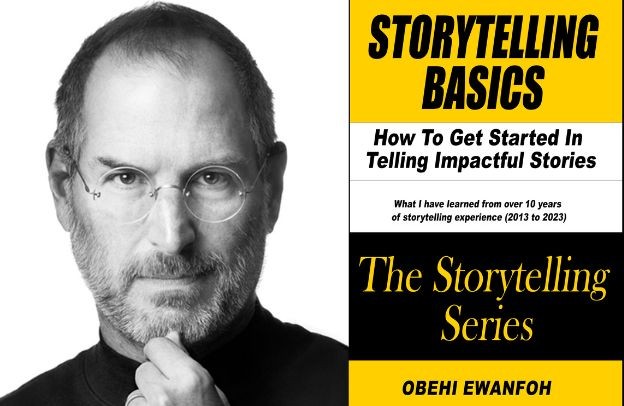How Steve Jobs Transformed Marketing And What Small Businesses Can Learn From It

Are you a small business owner and want to tap into the power of storytelling in your business? Then, let’s explore the captivating marketing evolution of the legendary Steve Jobs. Discover the valuable insights he learned from his failures that reshaped the way he approached marketing strategies and became an ultimate legend in branding.
Download the first chapter of The Storytelling Series: Beginners’ Guide for Small Businesses & Content Creators by Obehi Ewanfoh.
Who was Steve Jobs?
As an American business magnate, innovator, and investor, Steven Paul Jobs played key roles in various prominent companies. He co-founded Apple, where he served as the chairman and CEO. Additionally, he held the position of chairman and majority shareholder at Pixar. After Disney acquired Pixar, he became a member of The Walt Disney Company’s board of directors. Jobs was the founder, chairman, and CEO of NeXT. So, Jobs certainly was a prominent figure in the American business world.
But that was not how he started. Like most people, Steve made some missteps he later learned from, and you too can learn from his mistakes.
What happened and what did he do about it?
One crucial lesson from Jobs came from a daring attempt to promote Apple’s revolutionary Lisa computer through a nine-page advertisement in The New York Times. However, this venture turned into a costly misstep, highlighting the significance of simplicity and customer-centricity in marketing.
The nine-page ad overwhelmed readers with technical jargon and complex details, failing to resonate with the broader audience. Jobs realized that bombarding customers with exhaustive information isn’t the key to success. Instead, the focus should be on crafting a simple, relatable message that connects with customers emotionally, addressing their needs and aspirations.
Of the failure of Lisa computer, one article stated, and I quote: “Price wasn’t the Lisa’s only problem. Its sophisticated operating system, which allowed multiple programs to run at the same time, was too powerful even for its 68000 processor, and the machine thus ran sluggishly.”
After his departure from Apple, Jobs ventured into Pixar Animation Studios, where he discovered the power of compelling storytelling. The success of films like Toy Story and Finding Nemo deepened his understanding of emotional connections with audiences. When he eventually returned to Apple in 1997, Jobs applied this knowledge to create iconic campaigns, including the unforgettable “Think Different” initiative.
The essence of Jobs’ legacy lies in his commitment to simplicity and customer-centricity. By embracing these principles, Apple transformed its marketing, product design, and user experience, resonating with consumers on a profound level.
Today, Apple continues to honor Jobs’ legacy, placing simplicity and customer-centricity at the heart of its brand and innovation.
As marketers navigating the ever-changing business landscape of 2023, we must remember the power of simplicity and effective communication, understanding our customers’ needs and desires.
If you have been attending our LinkedIn audio live events on the storytelling series on, you would have noticed that we spent a lot of time talking, specifically about that.
The point is, let us be inspired by Steve Jobs’ transformative journey, challenging norms, and leaving a lasting impact on the world of marketing and business communication. That is also what my 5-parts “Storytelling Series for Small Businesses And Content Creators” is about. In today’s business ecosystem, we absolutely need to leverage the power of storytelling because it works almost all the time.
Now, here are three lessons, I think you can take away from the story of Steve Jobs above:
1. Embrace Simplicity in your Business Communication:
The first and most crucial lesson for small businesses is to embrace simplicity in their communication and marketing strategies.
The failure of Steve Jobs’ nine-page advertisement highlights the importance of delivering a clear and straightforward message to customers. Avoid overwhelming your audience with technical jargon or excessive details.
Instead, focus on conveying the core value of your product or service in a way that resonates with their needs and aspirations. Keep your messaging concise, relatable, and easy to understand to capture the attention and interest of potential customers.
2. Prioritize Customer-Centricity:
Another important lesson the story of Steve Jobs should remind small businesses is to always prioritize customer-centricity in their marketing efforts. Jobs realized that successful marketing involves addressing the desires and pain points of customers rather than merely highlighting product features. Understand your target audience deeply, and tailor your messaging to connect emotionally with them. By focusing on their needs, aspirations, and values, you can forge a strong and lasting connection with your customers. This approach extends beyond marketing and influences product development and user experience, enhancing overall customer satisfaction.
1. Harness the Power of Storytelling:
The transformative impact of storytelling is evident in Steve Jobs’ marketing journey. Small businesses can leverage the power of storytelling to engage their audience and drive meaningful connections. Develop a compelling narrative around your brand, emphasizing its unique value proposition and how it can positively impact the lives of customers.
Stories can evoke emotions, create memorable experiences, and establish a strong brand identity. By crafting authentic and relatable stories, small businesses can differentiate themselves in the competitive market and leave a lasting impression on their customers.
In summary, small businesses can learn the importance of simplicity, customer-centricity, and storytelling from Steve Jobs’ marketing journey. By adopting these lessons, they can enhance their marketing strategies, connect with their target audience, and ultimately achieve greater success in their endeavors.
Download the first chapter of The Storytelling Series: Beginners’ Guide for Small Businesses & Content Creators by Obehi Ewanfoh.





